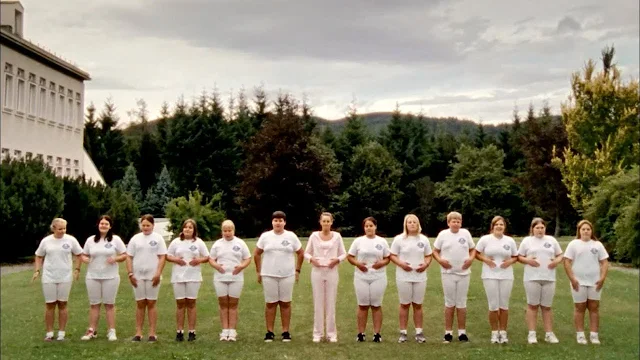 |
| Jason Franklin, Bette Henritze, and Julianne Moore in Far From Heaven |
Cathy Whitaker: Julianne Moore
Frank Whitaker: Dennis Quaid
Raymond Deagan: Dennis Haysbert
Eleanor Fine: Patricia Clarkson
Dr. Bowman: James Rebhorn
Sibyl: Viola Davis
Mona Lauder: Celia Weston
Director: Todd Haynes
Screenplay: Todd Haynes
Cinematography: Edward Lachman
Production design: Mark Friedberg
Music: Elmer Bernstein
Costume design: Sandy Powell
Homage never turns into parody in Todd Haynes's
Far From Heaven, a film whose very title alludes to Douglas Sirk's great 1955 melodrama
All That Heaven Allows. Haynes's film is set in 1957, only two years after Sirk's was released, but the sensibility that controls it is very much of an era almost half a century later. Haynes has the liberty to deal with matters that were taboo for American filmmakers in 1955, specifically miscegenation and homosexuality -- two terms that now have an antique sound to them. But his film has the same resonance as Sirk's: Both expose the raw wounds inflicted on people by social conventions, by the desire to "fit in" with what a given community establishes as its values. We like to think of the 1950s as the nadir of American conformity, a society on the brink of having its repressive qualities exploded by the rebellious 1960s, but although Haynes's film is a "period piece," I think it also provokes us to evaluate what restricts us today. We can pat ourselves on the back that we -- or at least the liberal-minded people in the circles in which I travel -- no longer recoil in horror at an interracial couple or find ourselves shocked, shocked that there are people who love others of their own sex. But just as Cathy Whitaker and her circle of friends retreat into an exclusive community, we too often find ourselves falling into a similar trap of smug self-righteousness that won't withstand the cold shock of reality -- like, for example, a presidential election gone awry. Cathy's blithe intellectualized conviction that all people are created equal is tested when she crosses the invisible line between the races. Her frustration at not being able to have a friendship with a black man -- i.e., someone other than the dull suburbanites that surround her -- is mirrored by her husband's inability to make his way out of the closet. But Cathy naively thinks that there's a "cure" for his problem, making it a lesser trial than her own, which she can blame on society. In the end, the beauty of Haynes's film is that he never yields to the temptation to impose a false liberation on his characters, an ending in which everyone lives happily ever after. Cathy sees Raymond off at the station, knowing that she'll never visit him in Baltimore. Frank is holed up in a hotel room with his lover instead of his spacious suburban home, his family life and probably his job now at an end. They are real enough characters that we want to know what will happen to them, but we suspect that there are no stirring triumphs ahead, only a struggle to rebuild damaged lives. Haynes and his team of cinematographer Edward Lachman, production designer Mark Friedman, costumer Sandy Powell, and composer Elmer Bernstein have crafted a 1950s world that's familiar to us from countless movies, but because of the shrewdness of the screenplay, the depth of the characterization, and the brilliance of the performers the film succeeds in making it real. There are stereotypes in the film, like Celia Weston's malicious gossip, but they are balanced by roles that could have fallen too easily into stereotypes -- Patricia Clarkson's best friend, James Rebhorn's doctor, Viola Davis's maid -- yet manage to develop dimensions of actuality.
Far From Heaven also does something that very few films inspired by older ones do: It illuminates its source, so that it's possible to watch
All That Heaven Allows again with a new understanding of Sirk's achievement.
Starz






